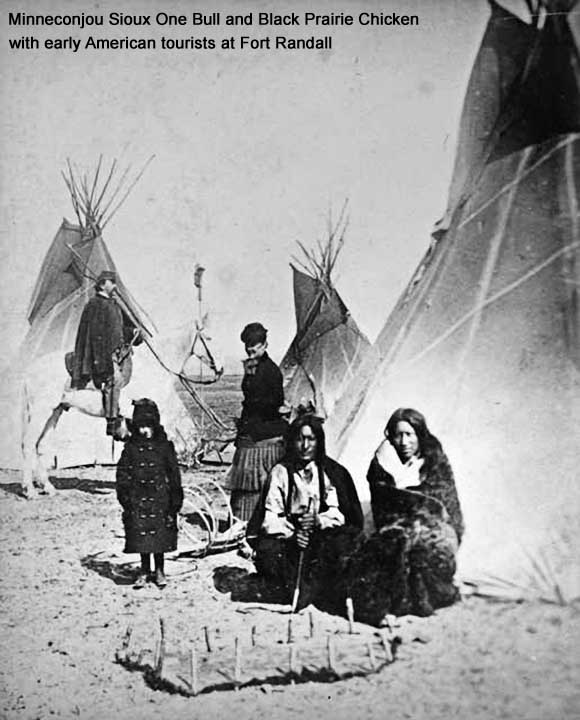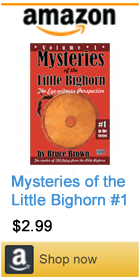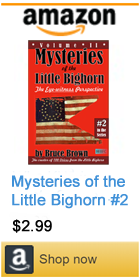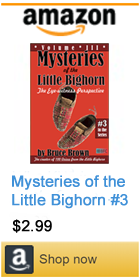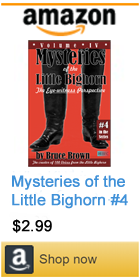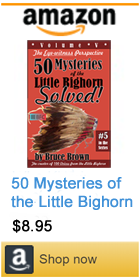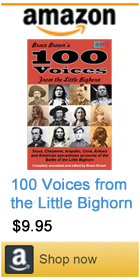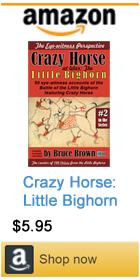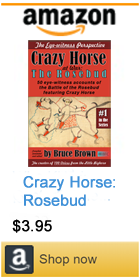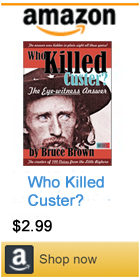|
|||||||
Bruce Brown's 100 Voices... One Bull's Story of the Battle
The night before the fight with Long Hair, Sitting Bull went out to the ridge where the monument now stands. He sang a thunder song, then prayed for knowledge of things to come. As he repeated for me later, he wailed aloud. Offering a filled pipe as he prayed: "Wakantanka, hear me and pity me! I offer you this pipe in the name of my people. Save them. We want to live! Guard my people against all danger and misfortune, lake pity on us!" Then he stuck slender wands in the ground to which he tied tiny buckskin bags of tobacco and willow bark. Next day Long Hair's horse soldiers would knock them all down, but that night my uncle knew that Wakantanka had heard his prayer. Before sunup an old woman died in the Hunkpapa camp. She was the wife of Sitting Bull's uncle, Four Horns. As Sitting Bull later told me, the death of such an important woman made him wonder if the promised victory might not come that very day. I was twenty-three that summer and had been a warrior a long time. Another Hunkpapa named Gray Eagle and I were Sitting Bull's special bodyguards. It was our duty to watch him and see that he had protection. I also had the duty of seeing that his orders were carried out by others and Io look after his property, That morning I took the family horses to the river.
At midday I went back to the pony herd and drove the horses to the river lor the noon watering, just then I heard shooting near the Hunkpapa camp tircle. I knew our camp soldiers [police] did not allow olfhand linng. So I recognized the shots as a warning of some kind of danger. I quickly caught my best pony and turned the other stock loose, knowing they would head back to camp as stxin as the hobbles were oil. Not faraway I sawdust rising and heard iron-shod hoofs pounding against loose rocks. I raced back to the tepe I shared with my uncle. The Hunkpapa camp was in an uproar. Warriors were rushing around to catch their ponies, Women were streaming and children were crying and old men were shouting advice as loud as they could. Then the women and children began to run off to the west, not taking the time to strike their tepees or to carry of belongings. I reached the tepee ahead of my uncle. I grabbed my old muzzleloader and quickly checked it. Just then Sitting Bull entered the tepee and took the old rifle out of my hands. He handed me a stone-headed war club, then took his own rawhide shield out of its buckskin case and hung; it over my shoulder. This shield was both for protection and to be used as a badge of the chief's authority. "You will take my place and go out and meet the soldiers that are attacking us," he ordered. "Parley with them, if you can. If they are willing, tell them I will talk peace with them."
The soldiers were mixed up. Some got off their horses and began firing again as we rode in. Others stayed mounted. Two soldiers couldn't hold their horses in all the excitement. The horses bolted, carrying their riders right into our warriors. These soldiers didn't last long! Then the soldier chief shouted something, and all the soldiers did a strange thing. They all got off their horses, except for every fourth man who held the horses for the other three. Then they ran on foot trying to get into the timber along the river. I raised my uncle's shield again and led another charge to chase them. They were turning around to shoot at us, but we rode right into them, chasing them into the river. We killed many on the river bank and in the water. I rode up behind one soldier and knocked him over with my war club. Then I slid off my pony and held the soldier's head under water until he was dead. I killed two more soldiers in the water. A Hunkpapa warrior named Good Bear Boy was riding alongside me and was suddenly shot off his horse. Black Moon fell about the same time. He was dead, but Good Bear Boy was only wounded. I ordered a warrior named Looking Elk to rescue him, but Looking Elk didn't hear me. Good Bear Boy tried to crawl back from the river.
Bullets were flying all around, but I saw that Good Bear Boy wasn't able to crawl back to camp. He was shot through both thighs and bleeding heavily. So I jumped off my pony long enough to help Good Bear Boy climb on, then I leaped up behind him. I heard my pony scream. A bullet had struck his hindquarters. I took Good Bear Boy bark to camp and saw that his friends took care of him. As I left him, I saw three soldiers running on foot toward the river. They had gotten away from us earlier in the fight. I charged after them, and they ran very fast. I wanted to ride them down, but just then 1 heard my uncle s voice. "O, come back, my son!" he shouted. Sitting Bull had seen the blood of Good Bear Boy and my pony all over my legs and thought I was wounded. Then he said: "Let them go! Let them live to tell the truth about this fight!" I obeyed. We let the three soldiers escape. My uncle looked worried. "Nephew, you are wounded. Go to the women and have your wounds treated."
"You have done well. You put up a good light. Now go help defend the women and children and old ones. More soldiers may come." I did as he ordered and joined our people west of the camp. Soon after I reached them, I saw more dust across the river. A second band of soldiers was riding down a coulee toward the ford by the Miniconjou camp circle. Another alarm went up. I saw a handful of warriors racing (o the lord to meet them. Then more warriors left the soldiers surrounded on the butte and galloped over to head off this second attack. They chased these new soldiers out of the coulee and up onto a long ridge. More of our warriors, mostly Oglalas and Cheyennes, were waiting for these soldiers at the end of the ridge and caught them in a trap. They were all wiped out in a short time. My brother White Bull [AKA Lazy White Bull] later said the leader of this second band of soldiers was Long Hair Custer. Excerpted from "Echoes of the Little Bighorn" by David Humphreys Miller, American Heritage, June 1971, p 28
The adopted son of Sitting Bull, and the brother of Lazy White Bull, One Bull was the titular Hunkpapa commander in the Battle of the Little Bighorn, having had that role bestowed on him at the start of the battle by Sitting Bull, who was recovering from the recent Sun Dance where he prophesied the great battle, and it's outcome. * * *
Miller frequenlty made pastel sketches of the Sioux survivors of the Battle of the Little Bighorn whom he interviewed. Some of Miller's portraits are exceptionally fine evocations of the historic personalities in their own right, such as his portraits of Lazy White Bull and Old Eagle and Black Elk late in life. Click here for information of David Humphreys Miller's sources among the Sioux, Cheyenne, Crow, Arikara and Apapaho. * * * This material was excerpted from Custer's Fall by David Humphreys Miller, and appeared in American Heritage, June 1971. -- Bruce Brown
|
|||||||



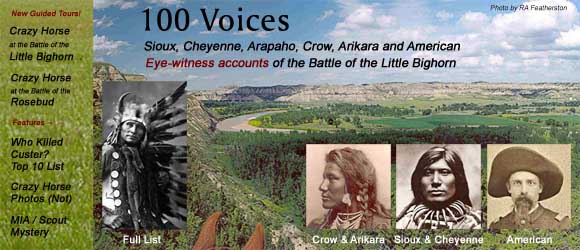
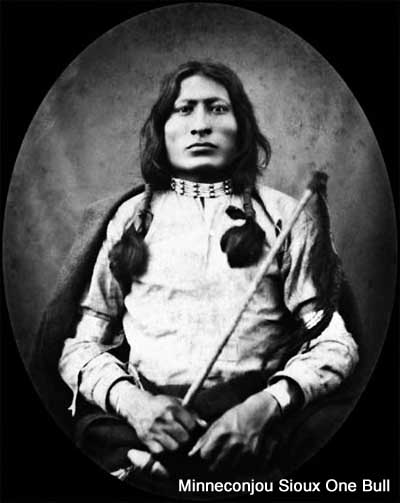 IT WAS the time when ponies are young [June]. During a sun dance we held on Rosebud Creek ten days earlier, my uncle,
IT WAS the time when ponies are young [June]. During a sun dance we held on Rosebud Creek ten days earlier, my uncle, 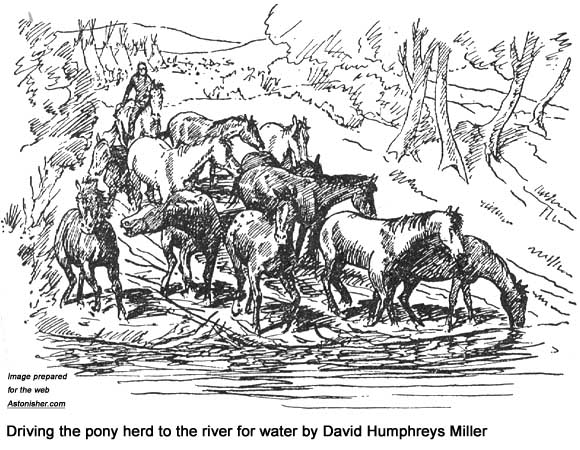
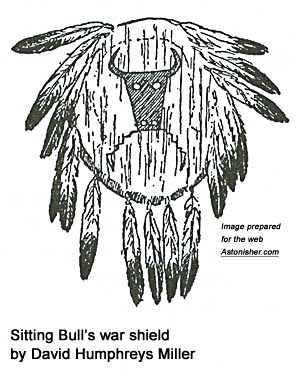 Sitting Bull was buckling on his cartridge belt as we hurried outside. His deaf-mute adopted son came running up with the chief's black stallion. Another bodyguard, named Iron Elk, handed my uncle a Winchester carbine and a revolver and held the stallion's jaw rope. Sitting Bull jumped on the stallion's bare back and galloped off to look for his old mother and get her to safety. Many young warriors gathered around me. I raised my uncle's shield high so they all could see it. Then I led them out to meet the soldiers.
Sitting Bull was buckling on his cartridge belt as we hurried outside. His deaf-mute adopted son came running up with the chief's black stallion. Another bodyguard, named Iron Elk, handed my uncle a Winchester carbine and a revolver and held the stallion's jaw rope. Sitting Bull jumped on the stallion's bare back and galloped off to look for his old mother and get her to safety. Many young warriors gathered around me. I raised my uncle's shield high so they all could see it. Then I led them out to meet the soldiers.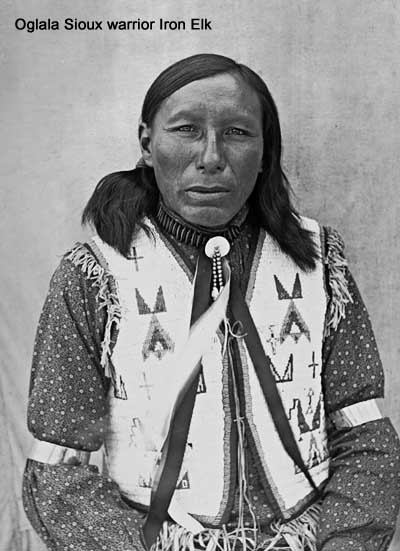 I saw many soldiers struggle across the river and climb out on the far bank. They ran to a high butte [now called Reno Hill], and from there they kept shooting at us. Some of them dug holes [trenches] in the ground and got into these holes or behind their saddles so we couldn't hit them. I ordered warriors to surround the butte so the soldiers couldn't get away. I wanted to starve them out. A Lakota told me later that the warriors kept those soldiers there all night. Finally, the soldiers began to get crazy for water. The Lakotas wouldn't let the soldiers go to the river to drink or get water to take back up to their holes in the ground. Two or three of them tried to crawl down to the river, but our warriors shot them.
I saw many soldiers struggle across the river and climb out on the far bank. They ran to a high butte [now called Reno Hill], and from there they kept shooting at us. Some of them dug holes [trenches] in the ground and got into these holes or behind their saddles so we couldn't hit them. I ordered warriors to surround the butte so the soldiers couldn't get away. I wanted to starve them out. A Lakota told me later that the warriors kept those soldiers there all night. Finally, the soldiers began to get crazy for water. The Lakotas wouldn't let the soldiers go to the river to drink or get water to take back up to their holes in the ground. Two or three of them tried to crawl down to the river, but our warriors shot them.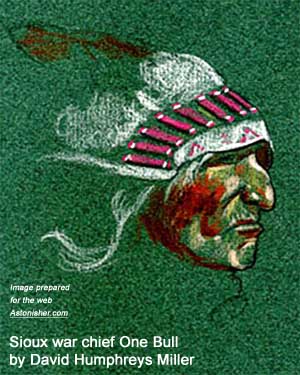 So I laughed, saying I wasn't wounded and telling him about Good Bear Boy.
So I laughed, saying I wasn't wounded and telling him about Good Bear Boy.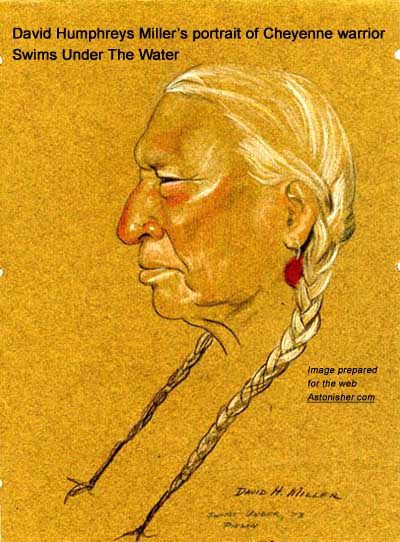 Although not born into the Teton Sioux, David Humphreys Miller was adopted late in life by both
Although not born into the Teton Sioux, David Humphreys Miller was adopted late in life by both 